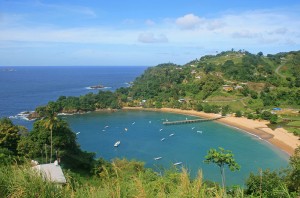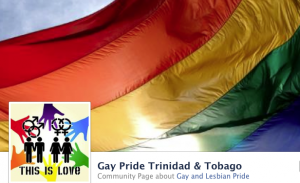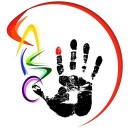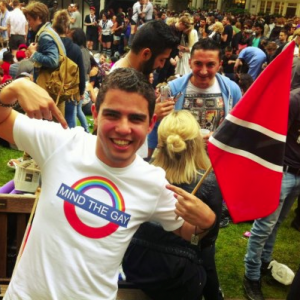Tropical Industry Versus Tourists
Trinidad & Tobago is one of 13 completely independent Caribbean sovereign states that are not overseas territories, departments, or dependencies of large far-off mostly European countries. The other 20 are politically attached to Europe and the USA. The island of Trinidad–the larger of which comprises about 94% of the total area and 96% of the population–and the much smaller Tobago together cover about 2000 square miles, slightly smaller than US state of Delaware, with a total population of almost 1,300,000 inhabitants.
Trinidad was a Spanish colony from the arrival of Christopher Columbus in 1498 until the arrival of British warships in February 1797. For nearly 200 years the island of Tobago changed hands between Spanish, British, French, Dutch and Courlander colonizers. Trinidad and Tobago together were finally ceded to Britain in 1802. The country obtained independence from the UK in 1962 and became a republic in 1976.
Unlike most of the English-speaking Caribbean, T&T’s close proximity to oil-rich Venezuela allows its energy-based economy to rely mostly on the petroleum and petrochemicals industry; T&T is the largest exporter of LNG to the USA. As such, it is a “high income developing nation” that does not depend on the waves of tourists and cruise ships from the North, although there is modest tourism given it’s pleasant location.
Like most other Caribbean countries T&T has it own version of Carnival. In a correspondence with members of CAISO (a human rights organization) Carnival is “complex with multifaceted cultural rituals and activities extending throughout much more of the calendar than its colorful climax in the springtime days before Lent. Its major components are pan (steelband), mas (masquerade characters, bands and competitions), calypso (a term used to encompass kaiso, soca, rapso, chutney music) and fetes (parties). Several parts of Carnival involve revelry and drinking, but Carnival is more than those. Transgression and sexuality are also a part of Carnival, but in pretty structured ways and propriety is not abandoned since children participate in most aspects of Carnival. Foreigners also participate in Carnival who sometimes “let their hair down and after much drinking let their prudery become loosened”.
Shadow and Light
Unfortunately T&T is one of nine Caribbean countries that still criminalizes homosexuality. In some of these, such as Jamaica and Dominica, there is harsh treatment of LGBT citizens who are caught engaged in illegal same-sexual contact.
Curiously however, despite the archaic anti-gay statutes left over from British rule, a visitor can find gays and lesbians in T&T who are more relaxed even if not fully open. Surprisingly, the gay scene in T&T is bigger than in any other Caribbean country except Puerto Rico.
The gay community is centered in the capital city of Port-of-Spain (population about 58,000). At any one time there may be more than one gay club but there has never been more than four operating in the entire country. “New places pop up and fade out, so it’s hard to keep up,” said one local leader.
Gay Pride has been celebrated for almost two decades, but the activities are neither outdoors nor public, so they don’t quite look like a festival. There are numerous gay events within Carnival masquerade but they are not publicly advertised and these are not yet ‘self-naming’. Said one local man with a laugh, “our gay community is very active mostly at partying.”
Such activities cannot be found on the anti-gay islands of Antigua & Barbuda, Barbados, Dominica, Grenada, St Kitts & Nevis, St Lucia and St Vincent & Grenadines with Jamaica considered to be the most risky country for gays. As well, the mainland territories of Belize (Central America), Guyana and Suriname (both South America) are also what regional people consider Caribbean countries because they are former European colonies and now sovereign states. Formerly British Belize and Guyana still criminalize homosexual acts but prosecutions for private consensual acts–in any of the other ‘forbidding’ Caribbean states–is very rare (outside of Jamaica).
This is not to suggest that T&T is a popular gay tourist destination or a local center for gay-lib. Past the urban centers homophobia is still present in the Indo-Afro-Caribbean cultures here (and elsewhere in the Caribbean). “But”, said one observer, “the complexity of everyday life goes beyond sexual issues in our country; it includes more real concerns about income inequality, crime, family affairs as well as activities of daily life: people going to work and school in rain and floods; voting and going to court and watching Oprah on TV and raising children.”

But there are always reminders of discrimination. As recently as June 2012 the T&T UN Ambassador Rodney Charles disparaged gay rights by stating that efforts by “those in support of gay rights and gender policy changes was all about sex and how they want to have it,” saying he would be “vigilant to oppose any form of endorsement or legal protection when it regards to sexual orientation or discrimination towards the category.”
Overall, an activist in T&T has advised, “Caribbean attitudes and violence towards GLBT people are not terribly different from those in parts of their own countries or earlier in their own lifetimes… the generalized view of the Caribbean (and the Global South) as backwardly homophobic is not accurate. Yes, homosexual sex here is criminal but the laws are hardly noticed. We think it’s much more productive to build political solidarity and partnerships to challenge homophobia ” by educating the public and lobbying the government to change unfair laws.
Pushing Back Against Discrimination
The main advocacy groups opposing such anti-gay prejudice are the Coalition Advocating for Inclusion of Sexual Orientation’ (CAISO and the Trinidad & Tobago FreePride Foundation Project (FreePride). CAISO was founded in 2009 as a public forum in order to raise awareness among lay people and elected officials about the needs and issues of gay T&T citizens.
These groups draw inspiration and challenge from a disturbing study in 2009 carried out by the University of the West indies for the Ministry of Social Developments which concluded that four of every five Trinbagonians believe in denying someone rights or equality based on one’s sexual orientation. Such disrespect of human rights speaks to the degree of prejudicial attitudes that can be found on the two-island nation.
But that has not discouraged those in active pursuit of change and equality. The director of CAISO, Colin Robinson, recently said, “we believe strongly that government leadership and capacity-building on SOGI (sexual orientation and gender dentity) issues is critical. To make this happen CAISO works to empower and organize ordinary people, to encourage them to speak up. That is how change happens.
“We challenges the Government on issues of gender policy and sexual orientation, including having presented a brief entitled “6 in 6”, highlighting six steps we would like to see implemented for the benefit of the LGBT community. These include equal opportunity, crime, homelessness, gender policy and safety in schools.”
 In addition to these, CAISO has several other policy priorities:
In addition to these, CAISO has several other policy priorities:
- to encourage and assist in building Government leadership, capacity (research, policy and program development) and encouraging public discussion on sexuality issues;
- include sexual orientation in legislative protections from discrimination; (photo right: CAISO logo)
- strengthen the training and accountability of police, criminal justice, immigration, victim support-and-prevention systems with respect to sexual orientation and identity, including gender-based violence;
- ensure schools are safe and supportive environments in which all children can fulfill their potential; to create a world of tolerance and diversity;
- develop health and social work programs in areas of social vulnerability, such as transgender healthcare.
The task is great but so is CAISO’s commitment to building a better society through cooperation with society and government, not through confrontation. They can also be seen on television and in the print media as well as heard on interviews on radio. In 2010 CAISO was confident and strong enough in its social and political activities to present its first public advocacy award.
The Women’s Caucus
“Another vital group is the Women’s Caucus. It is not a political organization; rather, it provides gay women with a forum to chat and express themselves beyond the party scene. It was formed to unify these women throughout Trinidad, and aims to help women of the LGBT community to know that they are not alone in their struggles. The Women’s Caucus also hosts social gatherings, using proceeds to aid the needy within the community.”
IDAHO Against Homophobia
Having said CAISO does not hold their Pride events (with the usual color, music and eros) in public places, they are a leading participant in the Day Against Homophobia walk that is very public. The event is not publicized as a ‘gay’ event but rather a rally against discrimination. On their Facebook page they announce the following: (https://www.facebook.com/notes/caiso-gspottt-trinidad-tobago/add-all-three/10150822068332763.) Second annual IDAHO walkabout urges Equal Opportunity Commissioners, Parliamentarians to “Add All Three”, outlawing age, HIV and sexual orientation discrimination. ”
“Allies and members of Trinidad and Tobago’s gay, lesbian, bisexual and transgender (GLBT) communities–and seven other NGO groups–will visit Government members walking about at lunchtime. Their goal is to raise awareness about the shared costs of prejudice, and to urge decision makers to ensure everyone is treated equally.”
Called ‘The Citizen’s Walk’, it symbolizes “the commitment of the wider community. Trinbagonians are becoming increasingly cognizant of the fact that the Equal Opportunity Act touches and concerns everyone.”
The lobbying efforts have had some positive effects on the normally slow government process. The Government agreed, in principle, to proactive policies to promote these rights, and measures to prevent and prosecute discrimination against such groups. “The issue of discrimination based on sexual orientation is one which remains a matter of concern… Trinidad and Tobago is seen as a leader in the region in relation to the manner in which it addresses the changing needs of its population…The law must evolve and grow to suit the needs of a continually developing society,” wrote CAISO.
Gay Marriage
Once a quiet back-burner issue, this hot-button topic was blown out of the closet when US President Barak Obama came out in favor of it earlier in May 2012 expressing his change of personal views. When a T&T government minister here was asked by the media for a response he said the issue was under review and a position would be announced at a later date.
Prior to that and since, CAISO has sought deliberately to keep the matter out of public debate, and repeatedly expressed their position that public debate at this time on the matter will only inflame arguments on sexual and gender issues, polarize the nation and forestall gains on other human rights policies that might be made in areas where greater consensus exists.
They were right. An activist from CAISO wrote, “the ensuing ‘debate’ that followed after May has largely consisted of disinformation and moral panic: religious groups’ and leaders’ public demonstrations, headline statements and newspaper advertisements opposing same sex marriage; the vast majority of talk radio callers and hosts, with one notable exception, have taken positions against it; a series of letters to newspapers written in opposition. In defiance, the newest GLBT advocacy group here, called ‘I am One’, that recently formed, pointedly has included marriage equality in its advocacy efforts, as stated in a newspaper story. As expected. the gender minister later made it clear that government’s forthcoming gender policy will not include same sex marriage.”
An important difference between Gay Pride and IDAHO is that Pride is identity based and IDAHO is issue based; non-GLBT participants have joined in both events.
Life on the ‘Down Low’
Another variant of Caribbean sexuality can be read about on a new online website called Discreet City, “the first online magazine created by and for Masculine Gay/Bisexual Men of Color.” One of their dozen-plus categories of information (politics, advice, health, social & travel, etc.) is Sex & Dating that includes talk about being on the ‘down low’, heterosexually married men who have sex with other men. Once a deep secret in the closet and underground, in recent years this has become widely known, including among women and spouses.
For ‘down-low’ men (women are not mentioned) in the homophobic Afro-Indo-Caribbean population in the Caribbean it is a way of life for survival’s sake as well as a way to find authentic pleasure (and love) while avoiding exposure and public shame. These folks are virtually invisible and very private. No one is going to reveal himself willingly; it’s secretive and plays on the edge of duplicity, deception and betrayal. It is emotionally stressful and is one of the worst consequences of the disease of homophobia. See this report on T&T life on down low.
A gay or lesbian tourist who happens to trick with a ‘down-low’ husband (or wife) is not likely to know the truth about their Mr/Ms Right-Now.
Another Legal Effort Against Discrimination
An initiative spearheaded by Trinidadian lawyer Tamara Sylvester and New Yorker Jacqueline Bevilacqua are documenting cases of actual victims of discrimination, facts and patterns, denial of services and employment based on sexual orientation and/or gender identity. The FreePride Foundation Project has joined in collaboration with this campaign initiative to raise public awareness of the value of the service within the country. They urge any discriminated individual or ally to come forth openly or privately to share their experiences to empower this potentially law changing resource that can strengthen drive to conform with international human rights and more importantly to protect & ensure the health & wellbeing of S.O.G.I people.

Sir Elton John
In 2007 a highly vocal and exaggerated campaign opposed Elton John’s entry into the country. This was led by a handful of pastors, mostly Pentecostal and Tobago based, who mounted this effort, that also included a Anglican archdeacon. But the Church as a whole did not participate, and the pastors were also ridiculed by several voices in the local media.
The basis of the pastors’ call was a colonial-era immigration law that allows homosexuals to be prohibited entry and deportation for those who “practice, assist in the practice, or share in the avails of homosexualism.”
Not only did the Chief Secretary of the THA rebuff the pastors, the national government, responsible for immigration, issued a public waiver for John’s entry.
Further Reading about LGBT Trinidad & Tobago:
CAISO Facebook: http://www.facebook.com/caiso
Interview with Brendon O’Brien of CAISO : http://globewriter.wordpress.com/tag/homosexual-agenda/
T&T’s triggersite for SOGI passion & advocacy:
“Not only does this mean that people–especially young people–are taking stands in their own ways to speak out against discrimination on the basis on sexual orientation, but that politicians (at least within the PNM) can’t ignore that this is a real issue in our country…”
A 7-part story of a T&T trans M-to-F.
A Book of Caribbean LGBT writings
Gay Pride Facebook page
Gay Community Facebook page.
A study of T&T lesbians
Transgender Groups March















